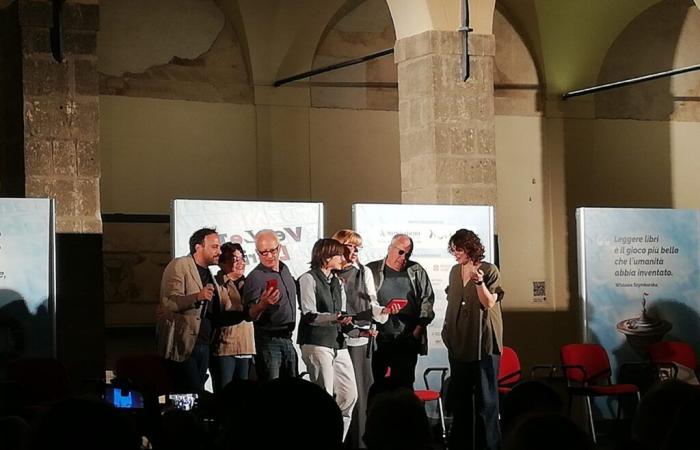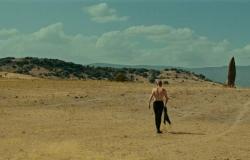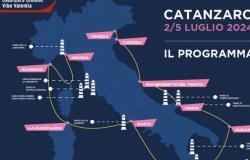A magical evening at the Cloister of the House of Culture and Music, for the second appointment of the eighth edition of the international literary review “Velletri Libris”, organized by the De Cultura Foundation and the Mondadori Bookstore Velletri-Lariano-Genzano-Cisterna-Frascati with the patronage of the Ministry of Culture, Lazio Region, Metropolitan City of Rome Capital, Sistema Castelli Romani and Municipality of Velletri.
With a packed audience in every seating order, the event welcomed authors of the six finalist books. Before the presentation there was space for the preview, preceded by the usual space dedicated to wines by Massimo Morassut of Crea Viticoltura Enologia and by the “Small prologue in verse”, a journey into Italian poetry with the voices of the poets Claudio Leoni and Giulio Mazzali who declaimed Margherita Guidacci, Emily Dickinson, Nazim Kikmet and Mahmoud Darwish. To welcome the owners of the bookshops and the Foundation, Guido Ciarla And Aurora De Marziwith Stefano Pedrocchipresident of the Strega Prize, Chiara ErcoliVice-Mayor of Velletri, e Giacomo Zito, director of FondArC. Works of art are also present in the Cloister by Matteo Castellano And Damiano Calcari for the exhibition organized by the Association Artemestieri Castelli Romani.
“The sextuplet is a close-knit group, which despite the prize it aspires to, manages to have fun and unite”: thus Flavia Capone, moderator of the evening, introduced Paolo Di Paolo, Donatella Di Pietrantonio, Tommaso Giartosio, Raffaella Romagnolo, Chiara Valerio and Dario Voltolini, who took their places on the Velletri stage for what was the last stage of the Strega Tour, which began for weeks now and which led them to visit the main locations in Italy. The authors were asked to comment on some passages chosen by Flavia Capone taken from their respective books.
Dario Voltolini, author of “Winter” for La Nave di Teseo, explained the importance of the page read in the economy of the narrative: “in this passage the son looks at his parents, framed from behind, in their room. It is the moment of diagnosis of the father’s illness.” Chiara Valeriowhich is in the final with “Chi dice e chi tace” (Sellerio), tells of Vittoria’s death and the enigmas that shake the community grappling with a murder in a small town. Raffaella Romagnoloinstead, with her “Aggiustare l’universo” (Mondadori) narrates “the clash between a young teacher and the director of a school, in the years after the Second World War, and the encounter with a mysterious little girl. There is a clash between the old and the new world”, said the writer in introducing the plot of her work.
Thomas Giartosio, author of “Autobiogrammatica” (Minimum Fax) instead focused on language: “language and language are different things, in this book I talk about language and how words are used, which are a fabric that makes up people. I really wanted to feel its materiality.” The question of language is also at the center in “L’età fragili” (Einaudi) by Donatella Di Pietrantonio: “I treated the language as something missing, having grown up in an environment where the language was stingy, especially with regards to the words of affections and feelings. Only concrete words linked to the land recurred, while the language of emotions is non-existent and this ruins families.” Paolo Di Paolo, to complete the interventions, described “Novel without humans” (Feltrinelli) as a book in which “the reflection of language occurs in dialectics with silence. We often struggle to transform silence, the unspeakable, into words. A difficulty that has cultural roots and that prevents you from unfreezing words even relating to things you feel very strongly,” she explained.
The second round of interventions focused attention on nostalgia: starting from Inside Out and the emotion in question, represented by a nice old lady who praises the past to be reconstructed through memory, all the authors contextualized the presence ( or not) of this condition in the respective works. For Dario Voltolini “nostalgia is the pain of returning to other places or of what you haven’t experienced”, while for Chiara Valerio “nostalgia starts when her protagonist asks herself what would have happened if she had realized in time what she felt his partner.” “Nostalgia is often filled by reading books,” she then added. For Raffaella Romagnolo, nostalgia is predominant in her novel, but it would be “more appropriate to understand it with the English term, homesick, or homesickness”. Tommaso Giartosio instead paints characters without nostalgia, referring to his parents who, as “protagonists of a new world, did not look to the past”. Donatella Di Pietrantonio forces her characters to “deal with the past and the trauma that marks the community, a necessary step to give meaning to the present and not sabotage it. Nostalgia is scary, especially at my age, because it doesn’t foresee the future.” Paolo Di Paolo instead made a distinction between public nostalgia, “always dangerous because if the past is a model, an allergy to change is created and recalls values that are now distant”, and private nostalgia, “not just regret but an analysis of the of the lost which as such shocks”.
The last round of questions and answers concerned the authors’ relationship with their books. Everyone gave a different version. Di Paolo defined it as heartbreaking, alluding to the work of restitution that readers do to the writer by reading his work. Donatella Di Pietrantonio spoke of “reconstruction of meaning that is not clear when it is written” and which occurs thanks to feedback from readers. Giartosio sees narrative as an external perspective that constructs life lived differently, while Raffaella Romagnolo defined the relationship with his books as “amorous”. Chiara Valerio used a rustic metaphor, that of ‘mozzarellaro’ which has a flow with which it shapes the material; Finally, Voltolini experiences a rapprochement with his work as time passes since its publication.
The evening ended with an exhilarating live performance by the writers of the sextuplet, who performed an improvised version of the song “Night before exams” involving the audience, before the long signing of copies and souvenir photos. A wonderful evening, in short, with “Velletri Libris” which hosted the Strega Tour for the second year.
“Velletri Libris” is conceived and created by the Mondadori Bookstore Velletri-Lariano-Genzano-Frascati-Cisterna and by the De Cultura Foundation and enjoys the patronage of the Ministry of Culture, the Lazio Region, the Metropolitan City of Rome Capital, the Municipality of Velletri and the Castelli Romani System , in collaboration with Fondarc. Food and wine partners are Casale della Regina and CREA Viticoltura-Enologia, who take care of the tastings with wines and culinary delicacies, while the main sponsors for the 2024 edition are Allianz FC Group 0001, Banca Popolare del Lazio, Clinica Madonna delle Grazie, and Class Car. To discover all the news of “Velletri Libris 2024”, the official website velletrilibris.it and the social channels are active, on which all the updates on every single evening will be promptly inserted. The next appointment is for Friday 29 Juneat 9pm, with another unforgettable evening: he will be a guest at the Cloister Lorenzo Maronewith a real show entitled “Generation X”, a semi-serious monologue by an unprepared fifty-year-old. With him Davide D’Alò. Entrance, as always free, is from 8 pm.






